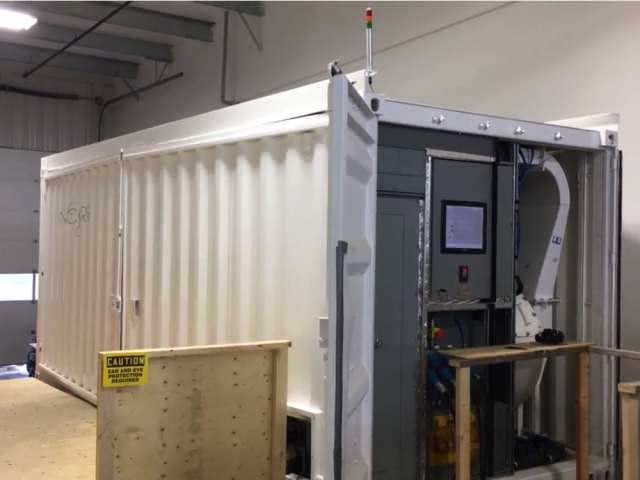Cheaper and Energy-efficient Method to Provide Clean Water to the Oil & Gas Industries
Published on by Water Network Research, Official research team of The Water Network in Technology
Innocorps company has developed a machine its founders say offers a cheaper, more energy-efficient method to provide clean water to the oil and gas industries, remote communities and areas hit by natural disasters.

This image, taken from a promotional video by Saskatoon-based company Innocorps, shows their first full scale working STRATO machine
“Water is going to be one of the fundamental resources of the future. It’s something that has to be solved,” said Brenton Wirachowsky, hardware engineer for Innocorps.
STRATO, developed by Innocorps, is a desalination device that fits into a 20-foot shipping crate. It can take water from any source, no matter how polluted or salty, and make it cleaner than tap water, according to Innocorps CEO Aarya Shahsavar.
The design won the company a Science, Technology, Innovation and Collaboration award from the Saskatoon Regional Economic Development Authority earlier this month.
Innocorps was founded in 2009 when Shahsavar, Alex Chan and Dawson James came up with the basic idea for the technology behind STRATO while they were studying engineering at the University of Saskatchewan.
They built their first small-scale prototype in a garage in 2011, while they were still in school. In 2014 they won $50,000 in the U of S’s Tech Venture Challenge, which allowed them to work on the company full time. Now they have a full scale working model.
STRATO works by evaporating the water, which separates it from the pollutants, then condensing it in a separate chamber.
Using evaporation to clean water is not a new idea.
“Our innovation, our secret sauce, is how we’ve changed that (process),” Wirachowsky said.
Innocorps has devised a method to evaporate the water at 60 C, rather than its regular 100 C boiling point, he said. The company has patents pending for the technology in Canada, the United States, Europe, Australia and India.
At 60 C, the machine can be made out of plastic rather than metal, which is much cheaper. It also requires a lot less energy for heating, which is always a challenge in evaporation technology.
Read full article: Saskatoon Star Phoenix
Media
Taxonomy
- Treatment
- Treatment Methods
- Technology
- water treatment
- Oil & Gas
- Natural Gas
- Oil & Gas